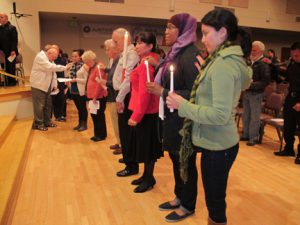Justice Overcoming North County’s Boundaries

Can churches in North San Diego County harness their spiritual energies to promote justice and peace in their communities?
The Rev. Martin Luther King did it. Cesar Chavez and the UFW garnered strong church support for farm worker to win the grape boycott. And the Berrigan brothers, Daniel and Phillip, helped bring about an end to the Vietnam War.
Many believe this work can be done here in San Diego. At least that’s the hope of the leadership of Justice Overcoming Boundaries (J.O.B.), a national faith based organizing network that pulls churches together to create social change.
“Religious bodies often focus on personal piety,” the Rev. Madison Shockley told an audience of 250 Christians and Muslims gathered at Resurrection Church in Escondido on Nov. 15. “Too often our eyes are downcast and our hands folded. But tonight we have our arms outstretched and we are organizing a foundation for justice in San Diego. Because this is what faith looks like.”
The audience cheered Shockley who is pastor of Pilgrim United Church of Christ in Carlsbad, one of four congregations forming a covenant to tackle social justice and peace issues in North County. The other members of J.O.B. are Resurrection Church (Escondido), the Independent Catholic Mission of Our Lady of the Angels (Escondido) and the Masjid Etihad mosque of Vista.
Attempts were made to recruit several other congregations, but J.O.B. organizers struck out. They discovered that most churches prefer works of charity rather than struggling with social justice issues. “It’s easier to feed the hungry than go to the root of hunger,” said a longtime San Diego community organizer. “They just don’t want to get involved.”
Another reason is the fear on the part of pastors that their conservative church members oppose social activism. “It’s true of most Catholic priests as well as Protestant ministers,” said the organizer. “They are looking over their shoulders and don’t want to offend anyone.”
Social justice covenants are not new to San Diego. J.O.B. has been working here for seven years and has 16 churches committed to justice work. They receive training and support from the Chicago based Ga-maliel Foundation. In return, the congregations raise funds to support the foundation’s organizing efforts.
Congregation based community organizing (CBCO) is not a new phenomenon. Saul Alinsky, the legendary community organizer, pioneered it in Chicago in the 1930s. His Industrial Areas Foundation (IAF) has organized thousands of congregations over the past sixty years. Alinsky’s philosophy of challenging and changing power structures has been so popular that the Tea Party successfully adopted them in recent years to run their candidates for office.
Currently there are more than 3,500 religious congregations and other faith-based organizations in the U.S. involved in community organizing projects. The United Church of Christ with its roots in New England congregationalism and commitment to justice and ecumenism, is a national leader in community organizing.
The premise of the IAF as well as Gamaliel is that distressed communities do not lack effective solutions, but the power to implement them. Indigenous leadership, they say, rather than a few charismatic leaders, can put together strong coalitions, train leaders and empower poor and margina-lized people for social change.
No specific justice issues were discussed at the Nov. 15 covenant ceremony. Shockley said that the congregations would re-group in January to develop a plan of action.
Some believe that Escondido, with its conservative city council and repressive police and immigration policies, is a good place to start.
After lighting symbolic candles at Resurrection church, members of the four congregations recited a covenant prayer:
“We declare that we are the congregations of J.O.B. We are united by the desire to end social isolation, to treat each other with dignity, to seek justice, equality and opportunity for all who reside in San Diego County. We welcome those of every race, creed, religious and political background to our mission.”
The Rev. Madison Shockley summed up the covenant promises in his final remarks: “We need to move outside the walls of our churches,” he said. “We will organize ourselves into a powerful force to break down the stereotypes that fuel racism and separation and to protect our brothers and sisters who are attacked and exploited.”
Mark Day is a journalist, filmmaker and labor activist. He can be reached at mday700@yahoo.com





